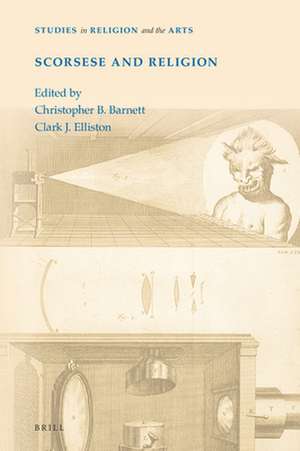Scorsese and Religion: Studies in Religion and the Arts, cartea 15
Editat de Christopher B. Barnett, Clark J. Ellistonen Limba Engleză Hardback – 18 sep 2019
Din seria Studies in Religion and the Arts
- 18%
 Preț: 696.44 lei
Preț: 696.44 lei - 18%
 Preț: 741.53 lei
Preț: 741.53 lei - 18%
 Preț: 640.08 lei
Preț: 640.08 lei - 18%
 Preț: 692.16 lei
Preț: 692.16 lei - 18%
 Preț: 634.20 lei
Preț: 634.20 lei - 18%
 Preț: 818.06 lei
Preț: 818.06 lei - 18%
 Preț: 664.80 lei
Preț: 664.80 lei - 18%
 Preț: 605.47 lei
Preț: 605.47 lei - 18%
 Preț: 630.19 lei
Preț: 630.19 lei - 18%
 Preț: 1043.75 lei
Preț: 1043.75 lei - 18%
 Preț: 630.19 lei
Preț: 630.19 lei - 18%
 Preț: 1281.79 lei
Preț: 1281.79 lei - 18%
 Preț: 793.70 lei
Preț: 793.70 lei - 18%
 Preț: 806.97 lei
Preț: 806.97 lei - 18%
 Preț: 649.04 lei
Preț: 649.04 lei - 18%
 Preț: 1037.79 lei
Preț: 1037.79 lei - 18%
 Preț: 813.07 lei
Preț: 813.07 lei - 18%
 Preț: 873.57 lei
Preț: 873.57 lei
Preț: 814.14 lei
Preț vechi: 992.85 lei
-18% Nou
Puncte Express: 1221
Preț estimativ în valută:
155.79€ • 163.06$ • 129.66£
155.79€ • 163.06$ • 129.66£
Carte indisponibilă temporar
Doresc să fiu notificat când acest titlu va fi disponibil:
Se trimite...
Preluare comenzi: 021 569.72.76
Specificații
ISBN-13: 9789004411371
ISBN-10: 9004411372
Dimensiuni: 155 x 235 mm
Greutate: 0.52 kg
Editura: Brill
Colecția Brill
Seria Studies in Religion and the Arts
ISBN-10: 9004411372
Dimensiuni: 155 x 235 mm
Greutate: 0.52 kg
Editura: Brill
Colecția Brill
Seria Studies in Religion and the Arts
Notă biografică
Christopher B. Barnett, D.Phil. (Oxford, 2008), is Associate Professor in the Department of Theology and Religious Studies at Villanova University, USA. In addition to numerous articles and book chapters, he has published three monographs, including Kierkegaard and the Question Concerning Technology (Bloomsbury Academic, 2019).
Clark J. Elliston, D.Phil. (Oxford, 2012) is Assistant Professor of Religion and Philosophy at Schreiner University, USA. Interested in the intersection of Christian theology, culture, and technology, he is the author of Dietrich Bonhoeffer and the Ethical Self (Fortress, 2016).
Contributors are: Christopher B. Barnett, Rhonda Burnette-Bletsch, Guerric DeBona, Mark Dennis, Clark J. Elliston, M. Gail Hamner, D. Stephen Long, Gerard Loughlin, John McAteer, Darren J.N. Middleton, Stephen Mulhall, Cari Myers, Marc Raymond, Kerry San Chirico
Clark J. Elliston, D.Phil. (Oxford, 2012) is Assistant Professor of Religion and Philosophy at Schreiner University, USA. Interested in the intersection of Christian theology, culture, and technology, he is the author of Dietrich Bonhoeffer and the Ethical Self (Fortress, 2016).
Contributors are: Christopher B. Barnett, Rhonda Burnette-Bletsch, Guerric DeBona, Mark Dennis, Clark J. Elliston, M. Gail Hamner, D. Stephen Long, Gerard Loughlin, John McAteer, Darren J.N. Middleton, Stephen Mulhall, Cari Myers, Marc Raymond, Kerry San Chirico
Cuprins
Acknowledgements
List of Illustrations
Notes on Contributors
Introduction
Christopher B. Barnett and Clark J. Elliston
1 The Catholic Scorsese – or How a Seminarian Turned to the Movies
Marc Raymond
2 No Way Out: Martin Scorsese and the Ecclesial Imagination
Guerric DeBona,osb
3 Dostoevskian Elements in Scorsese’s Cinema
Christopher B. Barnett
4 The Problem of Violence in Scorsese’s Films: The Catholic Gangster as Tragic Hero
John McAteer
5 Violence and Redemption in Scorsese’s Films: A Girardian Reading
Cari Myers
6 Scorsese as a Critic of Modernity: The Woman Question
M. Gail Hamner
7The Last Temptation of Christ: Scorsese’s Jesus among Ordinary Saints
Rhonda Burnette-Bletsch
8 Scorsese’s Kundun as Catholic Encounter with the Dalai Lama and His Tibetan Dharma
Kerry P.C. San Chirico
9 Pity and Pardon in Scorsese’s Palimpsest, Bringing Out the Dead
Gerard Loughlin
10 Martin Scorsese’s Screening Room: Theatricality, Psychoanalysis, and Modernity in Shutter Island
Stephen Mulhall
11 Reinventing Human Experience: Hugo and the Theological Possibilities of Film
Clark J. Elliston
12 The Wolf of Wall Street and Economic Nihilism
D. Stephen Long
13 The Global Afterlives of Silence
Darren J.N. Middleton and Mark W. Dennis
Index of Bible References
Index of Names and Subjects
List of Illustrations
Notes on Contributors
Introduction
Christopher B. Barnett and Clark J. Elliston
Part 1: Scorsese and Catholicism
1 The Catholic Scorsese – or How a Seminarian Turned to the Movies
Marc Raymond
2 No Way Out: Martin Scorsese and the Ecclesial Imagination
Guerric DeBona,osb
Part 2: Religious Influences and Themes in Scorsese’s Cinema
3 Dostoevskian Elements in Scorsese’s Cinema
Christopher B. Barnett
4 The Problem of Violence in Scorsese’s Films: The Catholic Gangster as Tragic Hero
John McAteer
5 Violence and Redemption in Scorsese’s Films: A Girardian Reading
Cari Myers
6 Scorsese as a Critic of Modernity: The Woman Question
M. Gail Hamner
Part 3: Scorsese and Religion: A Selective Filmography
7The Last Temptation of Christ: Scorsese’s Jesus among Ordinary Saints
Rhonda Burnette-Bletsch
8 Scorsese’s Kundun as Catholic Encounter with the Dalai Lama and His Tibetan Dharma
Kerry P.C. San Chirico
9 Pity and Pardon in Scorsese’s Palimpsest, Bringing Out the Dead
Gerard Loughlin
10 Martin Scorsese’s Screening Room: Theatricality, Psychoanalysis, and Modernity in Shutter Island
Stephen Mulhall
11 Reinventing Human Experience: Hugo and the Theological Possibilities of Film
Clark J. Elliston
12 The Wolf of Wall Street and Economic Nihilism
D. Stephen Long
13 The Global Afterlives of Silence
Darren J.N. Middleton and Mark W. Dennis
Index of Bible References
Index of Names and Subjects
